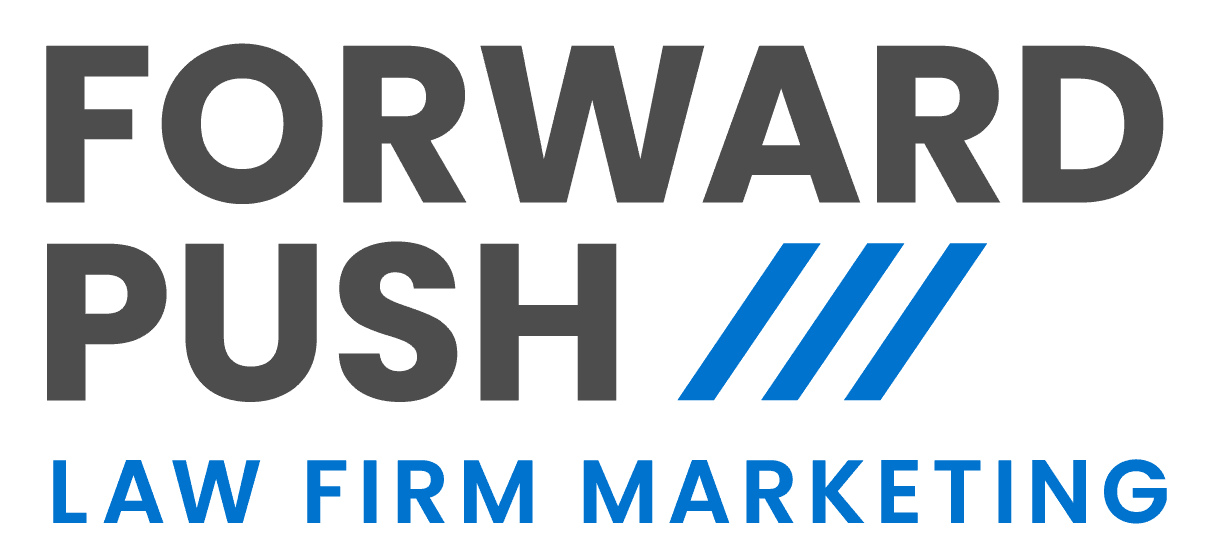By Marc Apple ● ● 6 min read

Table of Contents
TL:DR With tactical timelines, trust-building techniques, & compliance guidance, law firms can manage marketing campaigns that increase visibility.
No time to read? Listen to a conversation about this blog post instead.
Creating a strong marketing strategy is essential for law firms aiming to attract and retain clients. Whether your practice focuses on personal injury, criminal defense, family law, or corporate services, a well-structured marketing approach is your foundation for visibility and growth in a competitive landscape.
Why Your Law Firm Needs a Defined Marketing Strategy
Your marketing strategy is more than a set of promotions—it’s your opportunity to communicate what makes your firm valuable, trustworthy, and different. It provides direction for your outreach, helps clarify your messaging, and ensures that your resources are used effectively to reach the right people.

Every firm has something that sets it apart
Start With Your Unique Selling Proposition (USP)
Every firm has something that sets it apart. Start by answering these questions:
- What specific legal services do we excel in?
- What are our core values and mission?
- Why should a client choose us over another firm?
For example, a personal injury law firm might differentiate itself by highlighting its record of securing high-value settlements for clients or by offering 24/7 availability for accident victims. Another example could be a family law firm emphasizing its child-centered approach and dedication to minimizing emotional stress during divorce proceedings.
These answers will form your USP and guide all your marketing content and campaigns.
Know Your Ideal Client
Marketing without a clear understanding of who you’re trying to reach will lead to poor results. Go beyond demographics:
- What problems are your clients trying to solve?
- What are their concerns or fears?
- How do they research legal services?
Create client personas that reflect your target audience’s motivations and behaviors. This will ensure your messaging connects with those most likely to hire you.

Marketing without a clear understanding of who you’re trying to reach will lead to poor results
Use the Right Digital Marketing Channels
Not all channels are created equal, and different law firms may benefit from prioritizing specific marketing tactics based on their practice area, geographic scope, and budget. For example, a personal injury firm in a competitive metro market might invest heavily in PPC and local SEO, while a boutique estate planning firm might rely more on content marketing and referrals. Consider your goals and resources before selecting your core channels.
In today’s digital-first world, your online presence needs to be strong, consistent, and strategic. Key channels include:
- Search Engine Optimization (SEO) SEO is the backbone of organic traffic. Below is a timeline to help structure your initial 90 days:
| Timeline | Action Items |
|---|---|
| Week 1–2 | Audit your current website; check speed, mobile usability, and SSL status |
| Week 3–4 | Conduct keyword research and map keywords to practice area pages |
| Week 5–6 | Update or create local listings (Google Business Profile, Avvo, Justia) |
| Week 7–8 | Start a legal blog series answering frequent client questions |
| Week 9–10 | Gather and publish client reviews |
| Week 11–12 | Evaluate ranking improvements and iterate content strategy |
For law firms, Local SEO is especially critical—optimize your Google Business Profile, solicit client reviews, and build citations in legal directories like Avvo, Justia, and FindLaw to appear in local search results.—optimize your Google Business Profile, solicit client reviews, and build citations in legal directories like Avvo, Justia, and FindLaw to appear in local search results.
- Pay-Per-Click Advertising (PPC) For quick visibility, PPC can put your firm in front of clients actively searching for legal help. Here’s a basic rollout plan:
| Timeline | Action Items |
| Week 1 | Choose your platform (Google Ads, Bing, Facebook) |
| Week 2–3 | Set a monthly budget and identify high-intent keywords |
| Week 4 | Create ad groups specific to practice areas and locations |
| Week 5–6 | Launch ads and install conversion tracking tools |
| Week 7–8 | Analyze click-through rates and cost-per-click; adjust bids as needed |
| Week 9–10 | Refine ad copy and add negative keywords to reduce wasted spend |
Avoid generic campaigns; tailor ads to your practice areas and local market.
- Social Media Marketing Build relationships and extend your reach by sharing helpful legal tips, client testimonials, and firm updates on platforms like LinkedIn, Facebook, and Instagram. Social proof and regular engagement help position your firm as accessible and trustworthy. Here’s a timeline to get started:
| Timeline | Action Items |
| Week 1 | Choose 2 platforms based on your audience (e.g., LinkedIn for B2B, Facebook for local clients) |
| Week 2–3 | Create or update your profiles with bios, logos, and practice area details |
| Week 4–6 | Plan and schedule 2–3 posts per week using a content calendar |
| Week 7–8 | Use hashtags, local tagging, and boost top-performing posts |
| Week 9–10 | Run a small engagement ad campaign and review analytics |
- Content Marketing Create content that builds authority: blog posts answering frequently asked legal questions, explainer videos, downloadable guides, and client case studies. Use this phased plan:
| Timeline | Action Items |
| Week 1 | Identify 5 common client questions per practice area |
| Week 2–3 | Create a content calendar and assign content formats (blog, video, guide) |
| Week 4–6 | Publish 1 long-form post per week, cross-promote on social media |
| Week 7–8 | Develop a lead magnet (e.g., free downloadable checklist or guide) |
| Week 9–10 | Analyze engagement and refine topics based on performance metrics |
Focus on education and empowerment, not just promotion. Focus on education and empowerment, not promotion.
- Email Marketing Stay top of mind by sending newsletters, legal updates, or value-packed resources to current and prospective clients. Segment your audience to deliver personalized content that speaks to their specific needs. Here’s how to build and grow your email strategy:
| Timeline | Action Items |
| Week 1 | Choose an email platform (e.g., Mailchimp, Constant Contact, HubSpot) |
| Week 2–3 | Segment your list (e.g., by practice area, lead type, client stage) |
| Week 4–5 | Develop a welcome series for new leads and re-engagement emails |
| Week 6–7 | Plan and send your first monthly newsletter |
| Week 8–10 | A/B test subject lines and calls to action; analyze open and click rates |
Track Performance and Refine Your Approach Effective marketing requires continuous analysis. Use Google Analytics, CRM dashboards, and call tracking to evaluate performance. And always ensure your campaigns adhere to your state bar’s marketing and advertising guidelines—particularly around testimonial use, claims of expertise, and result disclosures. Use this ongoing review structure:
| Timeline | Action Items |
| Monthly | Review traffic, leads, conversion rates, and top content |
| Quarterly | Audit SEO rankings, ad spend ROI, and email open rates |
| Biannually | Reassess platform strategy (e.g., invest more in PPC, pause underperformers) |
| Annually | Revise marketing plan based on goals, growth, and evolving regulations |
Then, refine your strategy based on this data. Invest more in high-performing channels and experiment with new formats or messages in areas needing improvement.
Build Trust Through Transparency and Service
Trust is a non-negotiable in legal marketing. Here are some ways to strengthen it:
- Showcase authentic client testimonials and reviews
- Maintain a professional, updated website with clear attorney bios
- Use video introductions from attorneys to add a personal, relatable touch
- Publish anonymized case results or success stories to show proven outcomes
- Be active in your community, both online and offline
- Offer free consultations or legal resources to demonstrate value
Get a Free Internet Marketing Strategy Evaluation
Ready to see how your firm’s strategy stacks up? Let’s review it together—click to schedule your free Lead Flow Acceleration Session right now.
FAQ About Law Firm Marketing Strategies
What should a law firm include in a marketing strategy?
A comprehensive strategy should include your firm’s goals, target audience, USP, core marketing channels (like SEO, PPC, and social media), and metrics for measuring success.
Why is SEO important for law firms?
SEO improves your website’s visibility on search engines, helping potential clients discover your services when they’re searching for legal help.
What’s the most effective digital channel for law firms?
There’s no one-size-fits-all. SEO and PPC are essential for visibility, while social media and email are key for engagement and retention.
How do I track the success of my marketing efforts?
Use analytics tools to measure traffic, lead sources, conversion rates, and cost-per-lead. Review performance regularly and make data-driven decisions.
How often should a law firm update its marketing strategy?
At least quarterly. Frequent reviews ensure your tactics remain aligned with client behavior, platform changes, and firm goals.
Should small law firms invest in PPC?
Yes—when targeted correctly, PPC can produce fast results, especially in competitive areas. Start with a modest budget and refine based on performance.
How can law firms build trust online?
By maintaining transparency, showcasing client results, providing valuable content, and being responsive to client inquiries and reviews.




